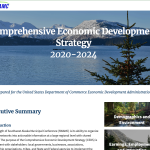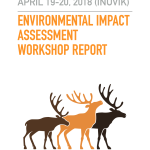Infrastructure
Infrastructure and Community Resilience in the Changing Arctic: Status, Challenges, and Research Needs
Permafrost thaw is one of the world’s most pressing climate problems, already disrupting lifestyles, livelihoods, economies, and ecosystems in the north, and threatening to spill beyond the boundaries of the Arctic as our planet continues to warm. To examine the effects of permafrost degradation, and increase our understanding of what this phenomenon means for the future of the region (and the world), The Arctic Institute’s new two-part permafrost series aims to analyze the topic from scientific, security, legal, and personal perspectives.
2023 Arctic Coasts Workshop Report: Changes, Impacts, and Solutions - Working Towards a Resilient Future
The Arctic Coasts Workshop was held on October 9 to 11, 2023 at the University of Colorado Boulder. 64 in-person and 4 on-line participants attended the workshop. The goal of the workshop was to bring together a dynamic group of experts to exchange knowledge regarding coastal hazards and impacts, strengthen and expand partnerships, and develop actionable and immediate recommendation for Arctic research and community resilience.
Integrating Indigenous Knowledge to Co-Design more Effective Operations, Maintenance, and Management of Water Infrastructure in the Arctic
Rural Alaskan communities experience significant challenges in developing and operating water and sewer infrastructure systems. Their remote location, freezing temperatures, and regulatory hurdles often inhibit their ability to provide adequate water services. Moreover, engineered water systems are sometimes designed without using local knowledge and experience. Finally, training and certification requirements are often unreasonable and not suited to the local population, creating a gap in the local workforce.
Balancing Wildfire Risks and Power Outages due to Proactive Public Power Safety De-Energizations
Faults on overhead power line infrastructures in electric power distribution systems (DS) can potentially ignite catastrophic wildfires, especially in areas exposed to high wind regimes, low humidity and dense vegetation. The common practice adopted by electric utilities to build resilience against such electrically-induced wildfires is called public-safety power-shutoff (PSPS): strategies to intentionally and proactively de-energize power line infrastructures to prevent wildfire risks.
Comprehensive Economic Development Strategy 2020-2024
The purpose of the Comprehensive Economic Development Strategy (CEDS) is engagement with stakeholders: local governments, businesses, associations, membership organizations, tribes, and State and Federal agencies to implement the collective best practices for the improvement of the regional economy. The CEDS is to be an evolving, guiding document for SWAMC, providing direction that supports economic development in the region backed by quantifiable data and the insight of our leadership.
Environmental Impact Assessment Workshop Report
The goals of the Workshop were threefold: (1) to share information gathered through the Arctic Council project with the communities; (2) gain insights that can be shared with the Arctic Council project on best practices emanating from the Gwich’in Settlement Area; and (3) provide an opportunity to build capacity and facilitate discussions amongst those involved in Environmental Impact Assessments.

